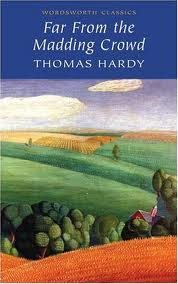
I’ve been having some trouble sleeping so am often awake from 3 am for a bit, and was the other night. At some point one does have to read FAR FROM THE MADDING CROWD, and I guess this was my point.
FAR FROM THE MADDING CROWD tells the story of one Gabriel Oak, a shepherd who has managed to take out a loan to get his own flock and some land. He asks a local young lady, Bathsheba, to marry him. She refuses. Some time after this his young dog in an excess of zeal keeps chasing the sheep till he forces them over a cliff.
George’s son (the dog) had done his work so thoroughly that he was considered too good a workman to live, and was, in fact, taken and tragically shot at twelve o’clock that same day – another instance of the untoward fate which so often attends dogs and other philosophers who follow out a train of reasoning to its logical conclusion, and attempt perfectly consistent conduct in a world made up so largely of compromise.
Gabriel is thus destitute again, as all his investment, the fruit of ten years work, is wiped out. This all happens before page 33. I was not surprised. I know very well not to trust Hardy, his books are hectic. He will crush you soon as look at you. I learnt this from reading JUDE THE OBSCURE, and I won’t give away the plot, but suffice to say, don’t get too attached to the children.
Anyway, Bathsheba has inherited a farm, and employs Gabriel, much to his chagrin. She marries a certain Sgt Troy who is irritatingly obviously going to be trouble, and he is, eventually faking his own death after his pregnant ex-girlfriend appears and dies of starvation on the doorstep. When he resurrects himself Bathsheba’s new boyfriend shoots him dead, and goes to jail himself. Enter Gabriel, and a happy ending.
So a story not lacking in drama, much of it stupid. However it was entertaining, and there is a supporting cast of yokels which is hilariously well written. Also, Hardy as a philosopher has much to say that is of interest – I enjoyed this, on Gabriel after his loss:
He had passed through an ordeal of wretchedness which had given him more than it had taken away. . . . . There was left to him a dignified calm he had never before known, and that indifference to fate which, though it often makes a villain of aman, is the basis of his sublimity if it does not. And thus the abasement had been exultation, and the loss gain.

I read and liked Jude the Obscure. I have this one on my shelf waiting to be read. I agree with you on Hardy. He would deceive you and crush you.